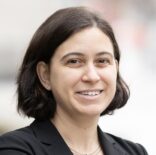Across cultures and time, many have been obsessed with the Fountain of Youth. But I’ve found the secret. In fact, if current trends continue, I’m destined to be a “young adult” forever.
The American Library Association defines young adults as between the ages of 12 and 18. Yet too many Jewish communal organizations’ initiatives to engage and involve “young adults” have self-described audiences of Jews in their 20s, 30s and even early 40s.
While the desire to engage and involve new leaders is admirable, they shouldn’t be relegated to a “kids’ table,” a young leadership group designed to involve them, while remaining distinct from the essential missions of our organizations. If the work of these organizations is so important (and I do believe it is), they must find ways to engage and cultivate genuine new leadership.
Of the current United States senators, 22 were elected to the Senate by age 45. Forty-two percent of the current members of the House of Representatives were elected to that body by the same age. But in the Jewish community, there is a perceived dearth of involvement from those in their 30s and 40s, and therefore, they receive specified outreach which often results in their segregation.
It’s not for lack of ability or skill. In a demographic survey of leaders in “establishment” and “non-establishment” Jewish organizations, sponsored by the Avi Chai Foundation and called “Generations of Change: How Leaders in their Twenties and Thirties are Reshaping American Jewish Life,” Jack Wertheimer found that more than 50 percent of Jewish leaders over age 50 were leaders in establishment institutions alone. This involvement drops to 27 percent for leaders in their 30s, and to a dismal 13 percent for leaders under 30 who were satisfied with being in the institutional establishment alone. As for the youngest leaders surveyed, 48 percent of the under-29-year-old set manifested their leadership wholly in non-establishment organizations.
All those respondents in the study were leaders, but among the younger cohorts, they took a preponderance of their talent elsewhere, sensing, perhaps, the continued reluctance on behalf of the establishment to give them serious responsibility and participation in governance and agenda setting.
It is true that, in the last several decades, many conventional markers of adulthood — age of marriage, purchase of a home, having children — are happening later than in previous generations, but pushing off life events does not make individuals any less able to take on leadership roles. In fact, many do so at younger ages because they have more time on their hands, as well as in order to develop their professional and volunteer experiences. The Jewish community would benefit from taking advantage of this phenomenon.
Two weeks ago we celebrated the inauguration of President Obama, but did you know that when he was elected to the Senate, he would have still been in the age bracket of many Jewish organizations’ “young adult” groups? As would have Tony Blair when he became England’s prime minister at age 44, and Susan B. Anthony, who rose to prominence in the fight for voting rights for women and African Americans while still in her early 30s.
At age 26, Rev. Martin Luther King Jr., became the leader of the Montgomery bus boycott. By age 35, he was on the cover of Time Magazine as “Man of the Year” and was awarded a Nobel Peace Prize. America is better off as a country because the Montgomery Improvement Association did not have a designated young leadership division.
Many Jewish communities are successfully served by recently ordained rabbis as their spiritual or professional leaders; we all stand to gain by taking advantage of the contributions that lay leaders of the same age can make to our organizations and communities.
If those who do have a seat at a table of decision makers truly want to engage the next generation of leaders, they must advocate for the substantive inclusion of younger voices at the grown-ups’ table.
Continuing to raise the age of “young” adulthood won’t address the detachment of those who would participate but were waved away for lack of experience or ability to make a top-tier financial contribution. What is needed is a true openness to new ideas, a willingness to engage and mentor new leadership, and the courage to let someone with less experience take a chance at leading. Perhaps the Fountain of Youth can yet bestow its miracles on the Jewish community after all.
Rabbi Ashira Konigsburg is associate director of rabbinic services at the Rabbinical Assembly. Follow her on twitter: @ashirak.
The New York Jewish Week brings you the stories behind the headlines, keeping you connected to Jewish life in New York. Help sustain the reporting you trust by donating today.





